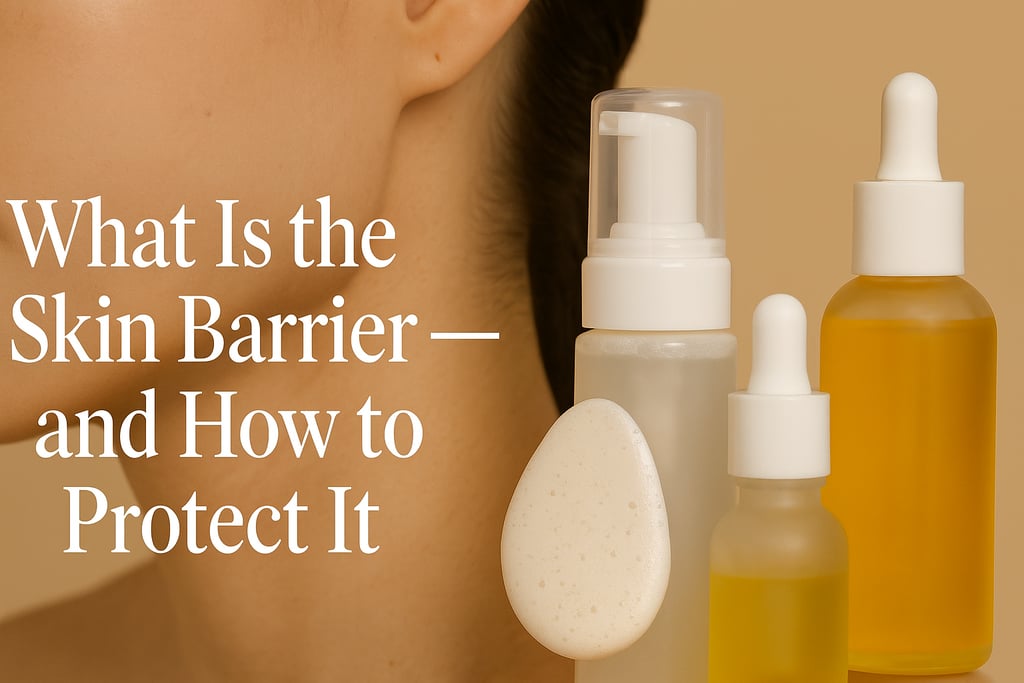What Is the Skin Barrier — and How to Protect It
Your skin barrier does more than you think. Learn what it is, why it matters, and how to protect it with pH-balanced, nourishing skincare products.
SKINCARE & CLEAN BEAUTYWHAT WE RECOMMEND
7/3/20252 min read


What Is the Skin Barrier — and How to Strengthen It Naturally
Introduction: Why the Skin Barrier Deserves Attention
Your skin might be screaming for help — but are you listening? From redness and dryness to unexpected breakouts, your skin could be telling you that your barrier is compromised. This invisible shield plays a vital role in your overall skin health. In this guide, we’ll break down what the skin barrier is, how to know if it’s damaged, and what you can do to protect and heal it using gentle, barrier-supporting skincare.
What Exactly Is the Skin Barrier?
The skin barrier refers to the outermost layer of your skin, scientifically known as the stratum corneum. Think of it as a brick wall: your skin cells (the bricks) are held together by lipids (the mortar), including ceramides, cholesterol, and fatty acids. Together, they create a protective shield that locks in moisture and keeps out harmful bacteria, irritants, and pollutants.
Why a Healthy Skin Barrier Matters
When your barrier is functioning properly, your skin feels soft, hydrated, and balanced. It locks in moisture, blocks irritants, and even protects against environmental aggressors like UV rays and pollution. It’s essential for preventing premature aging, breakouts, and sensitivity.
Signs Your Skin Barrier Is Damaged
Not sure if your barrier is compromised? Watch for these common signs:
Redness or inflammation
Dry, flaky patches
Breakouts or irritation
Itchiness or tightness
Burning or stinging sensation when applying products
Dehydrated skin that doesn’t improve with moisturizer
If your skincare routine isn’t working like it used to, your barrier might be to blame.
What Damages the Skin Barrier?
Even with good intentions, we often sabotage our skin barrier unknowingly:
Over-exfoliating with scrubs or acids
Using harsh, alkaline cleansers
Sun exposure without SPF
Cold or dry weather
Lack of sleep or high stress
Overloading active ingredients like retinol, AHAs/BHAs
These factors strip the skin of its natural oils, disrupt its pH balance, and make it more prone to irritation.
How to Repair and Protect Your Skin Barrier
The good news? Your skin barrier can heal — with the right care.
1. Simplify your routine: Skip the 10-step routines. Focus on a gentle cleanser, hydrating serum, moisturizer, and SPF.
2. Use pH-balanced, fragrance-free products: Avoid harsh soaps and alcohol-based toners. Look for products that support the skin’s natural acidity (around pH 5.5).
3. Prioritize barrier-repairing ingredients:
Ceramides to replenish lipids
Niacinamide to strengthen and brighten
Squalane to lock in moisture
Panthenol to soothe and repair
Fatty acids to support cell structure
4. Stay hydrated and wear sunscreen daily: Internal and external hydration are equally important. Protect your skin from UV rays to prevent further barrier breakdown.
Editor’s Picks: Barrier-Friendly Skincare
Looking for clean beauty that supports your skin barrier? Try these essentials:
Etude House SoonJung 5.5 Foam Cleanser — Gentle, low-pH cleanser
Klairs Rich Moist Soothing Cream — Soothes and hydrates
Pyunkang Yul Moisture Ampoule — Lightweight, calming hydration
iUNIK Centella Calming Gel Cream — Perfect for stressed, inflamed skin
Available now on Pinknblossom.com — Fast/Free Shipping across US and Canada $65 CAD, Free samples with every purchase.
Final Thoughts: Listen to Your Skin
Your skin is smarter than you think. When your barrier is strong, it can take care of the rest. By choosing the right ingredients, avoiding harsh treatments, and staying consistent, you can repair damage and build a glowing, resilient complexion.
Remember: healthy skin starts with a strong foundation. Protect your barrier, and it will protect you.
Quality You Can Trust
Discover handpicked, high-quality products that support a healthier, more intentional lifestyle.
Contact
Stay in the Loop
© 2025 Dealaha™ All rights reserved.
